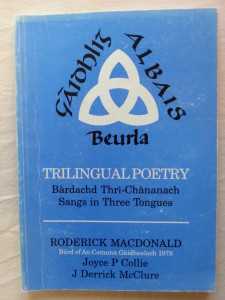
A Bilingual Anthology Introduced by Donald MacAulay
Canongate Books Ltd, 1995
220 d.
[Klappentext]
This indispensible anthology contains selections of the best work by Scotland´s most acclaimed modern Gaelic poets: Sorley Maclean, George Campbell Hay, Iain Crichton Smith, Derick Thomson and Donald MacAulay. Designed as much for English readers of Gaelic, the poems are presented with line-for-line translations. These translations have been made by the poets themselves, thereby maximising the retention of the spirit and form of the originals.
Donald MacAulay is Professor of Celtic at the University of Glasgow.
Standort: AA

Trilingual Poetry — Bàrdachd Thrì-Chànanach, Sangs in Three Tongues
Urras Gàidhlig Bhurns, 1995
65 d.
Schottisch-gälische Gedichte mit Übersetzungen ins Englische und Schottische; mit englischem Vorwort.
Standort: AA

Birlinn, 2008
216 d.
[Klappentext]
Gaelic is the everyday language in many parts of the Highlands and Islands and is also spoken in many of Scotland´s cities and towns. As such, it represents an important part of the United Kingdom´s cultural mix.
Covering essential points of grammar and pronunciation, and containing model sentences, key phrases, exercises based on real-life scenarios and a mini Gaelic-English dictionary, Scottish Gaelic in Twelve Weeks is the ideal introduction to the language, eminently suitable for self-learners and for use in the classroom.
Standort: AA (ohne CDs)

Pan Books Ltd., 1970
118 d.
[Klappentext]
„If you have a love for tradition as well as good food then A Taste of Scotland will send you into ecstasy“ DAILY MAIL
„A book to read and enjoy … a companion to Theodora FitzGibbon´s A Taste of Ireland. The same technique is used, combining traditional recipes with a terrific collection of historical photographs dating from between 1845 and 1900, which cast their own peculiarly poignant spell.
„The range of Scots cooking is wide, not surprising considering the influence of Scandinavia and the ‚well keipt ancient alliance, maid betwix Scotland and the realme of France‘, which inspires stovies, Lorraine soup, even haggis, not to mention Mary Stuart´s favourite biscuits.
„The recipes have been collected from manuscripts and family papers largely of eighteenth and nineteenth century origin. There is a feeling of fresh wholesome materials treated with simplicity and care. A lovely book.“ THE TIMES
„The Scots are among the greatest cold-weather (and high-tea-table) cooks in the world“ SHE Magazine
„A wonderful collection“ GOOD HOUSEKEEPING
„Fascinating as well as useful“ SCOTTISH FIELD
Standort: AA

Birlinn, 2000
231 d.
[Klappentext]
Norman Malcolm Macdonald´s last work is a powerful yet poetic novel that represents the summation of his life´s work. The historical boundaries of Portrona are set by two events linked with the island of Lewis — the Mutiny on the Bounty in 1789 and the sinking of HMY Iolaire in 1919. Whilst few know that the bo´sun of the Bounty was a Lewis man, the fate of the Iolaire and the 205 men drowned on her is an ingrained chapter of the island´s history. Using these two events as inspiration, Macdonald´s imaginative narrative explores the story of Lewis between these dates, its connections with the sea and the herring industry which was its life-blood. The result is an epic novel which sums up the soul of the Hebrides and of the Gael. From landlords and Madame Volkova the Russian herring buyer, to poets, fisherfolk, self-made men and factors, the author moves with the sweep and confidence of a man speaking not just for himself, but for a whole community.
Standort: AA

Anthology of 20th century Scottish Gaelic verse
Polygon, 2002
822 d.
[Klappentext]
For the first time, a full canon of twentieth-century Scottish Gaelic verse is available in one handsome volume. An Tuil is a unique bilingual anthology providing a much-needed and impressive overview of the high achievement and dramatic development of Gaelic verse in the twentieth century.
One hundred Gaelic poets of the century are represented through over 350 poems, including the work of Dòmhnall Ruadh Chorùna, Donald Macintyre, Sorley MacLean, George Campbell Hay, Derick Thomson, Iain Crichton Smith and Donald John MacDonald. The poetry deals with a range of subjects — comedy and satire, love and war, religion and politics. The chronological listing by poet, and extensive and detailed biographies, amount to a study of the Gaelic experience of the twentieth century. Complete with an informative introduction by Ronald Black, this definitive anthology presents the Gaelic view of the twentieth century and offers a literary perspective radically different from existing collections.
Ronald Black (Raghnall MacilleDhuibh) is a Senior Lecturer in Celtic Studies at the University of Edinburgh and Gaelic Editor of The Scotsman. He is a regular broadcaster, contributes to a wide variety of newspapers and journals, and most recently co-edited Celtic Connections (1999). He lives in Peebles, Scotland.
Standort: AA





